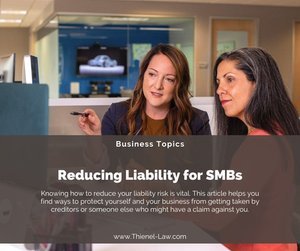Small Business Taxes to Watch Out for in 2021
Small business owners in Maryland need to keep their eyes on several things that can affect their taxes in 2021. The Tax Cuts and Jobs Act of 2018 significantly changed the taxation of small businesses. There have been tax incentives and programs to help businesses survive financially during the COVID-19 pandemic. Also, small businesses are subject to several types of taxes even when there are no pandemics or new tax code provisions.
A Columbia, Maryland small business tax attorney can explain the small business taxes to watch out for in 2021 and help you minimize your tax burden. Tax management should be an essential component of your company’s strategic planning. This planning should be an ongoing process.
The Tax Cuts and Jobs Act of 2018
Some of the Tax Cuts and Jobs Act of 2018 (TCJA) changes are getting phased in gradually over several years. Other changes took place right away but have a short window of effectiveness and are going to sunset soon. The impact of this legislation on small businesses is in a constant state of flux.
Deductions you have one year might increase, decrease, or disappear the next year. Some industries received larger tax breaks than others. The general corporate tax rate became lower, and there are new rules for pass-through entities. If you purchase eligible equipment or property, you might be able to deduct 100 percent of the purchase price rather than having to depreciate the cost over several years.
You cannot carry net operating losses back for two years anymore, but you can carry them forward with no current end date. The new method only applies to 80 percent of a company’s taxable income.
How COVID-19 Impacted Small Business Taxes
In 2020, the Internal Revenue Service (IRS) extended filing deadlines because of the COVID-19 pandemic. Tax returns previously due by April 15 received an extension until July 15, 2020. Some of the due dates for quarterly estimated taxes got moved back.
We do not know how the pandemic will affect the economy in 2021. The IRS might extend deadlines at various points throughout the year. The IRS already moved the start of tax season back to February 12, 2021.
Federal legislation that provided benefits to help keep businesses from failing because of COVID-19 have tax implications, including:
The Paycheck Protection Program (PPP) of the Coronavirus Aid, Relief, and Economic Security (CARES) Act distributed emergency loans to small businesses so they could afford to continue paying their employees even if they did not have money coming in because of the lockdown and other ramifications of the pandemic. The government made billions of dollars of forgivable loans to companies. If business borrowers spent the funds on rent or mortgage, payroll, and utility expenses, the loan amount can be forgiven and does not count as taxable income to the company. If the borrower did not spend the money on an approved expense category, the money has to be paid back and is taxable business income.
Under the terms of the Families First Coronavirus Response Act (FFCRA), some companies had to extend sick leave and family leave benefits for employees who became sick with or cared for a family member with COVID-19. One hundred percent of the costs of providing these benefits, including the wages and salaries paid to these employees while on leave and some indirect costs can be a tax credit for the employer.
Many businesses incurred higher than usual business interest expenses because of COVID-19. The CARES Act allows businesses to deduct this cost, up to 50 percent of the company’s adjusted taxable income, instead of the usual 30 percent limit.
The federal Small Business Administration (SBA) loosened the typical limitations of the Economic Injury Disaster Loan (EIDL) program to help companies that had to close their doors because of the COVID-19 mandated lockdowns or related economic downturns.
If COVID-19 adversely impacted your business, you might be able to take advantage of the Employee Retention Tax Credit (ERTC). If your quarterly gross receipts were less than 50 percent of what they were in the same quarter in 2019, you might qualify for this tax credit. Also, businesses that had to fully or partially close because of a COVID-19 government mandate can be eligible. This tax credit can be up to half of the qualifying employees’ wages between March 13, 2020 and January 1, 2021, up to $10,000 for each employee.
Some of these programs ran out of money quickly, but Congress replenished the funding in one or more additional waves of benefits. You need to make sure that you understand the rules of each program. Making an honest mistake could cost you plenty in additional taxes, interest, and penalties.
Like most American businesses, you likely must work harder to stay afloat during these challenging times. You do not have the time to become an expert on the complicated new regulations. Working with professionals can help you avoid problems now and later.
No one knows how long it will take before everyday life is back to normal and the economy will recuperate from the financial fallout from the COVID-19 pandemic, massive job losses, and shutdowns. Getting good advice can help you navigate these uncertain times and figure out what to do next. Things are changing rapidly, and what worked yesterday might not work today or tomorrow.
Taxes on Maryland Small Businesses
The types of taxes your company might have to pay will depend on your line of work and your business structure. For example:
Excise tax applies to businesses and self-employed people who make or sell certain categories of things, are in specific types of businesses, perform some kinds of services, or operate a business that uses particular types of products, equipment, or facilities.
Self-employment tax is how people who work for themselves contribute to Medicare and Social Security. This tax applies to net earnings, not gross earnings.
Employers pay matching contributions to Medicare and Social Security on behalf of their employees. Employers also withhold federal, state, and local income taxes from their employees’ paychecks and send that money to the government, along with federal unemployment tax.
Partnerships do not have to file income tax returns for the purpose of assessing taxes owed by the partnership, but every other type of small business does have to file tax returns and pay taxes. Instead of usual income tax returns, partnerships file informational returns that disclose how much income each partner received from the business and the income tax liability is passed through to the partners.
If you personally do not have sufficient tax withheld from your paychecks through payroll deductions, you must file quarterly estimated income taxes. Independent contractors and self-employed people can fall into this category. Many other businesses have to file quarterly estimated taxes as well.
Contact a Columbia, Maryland Business Tax Attorney
A Maryland small business tax attorney can help you explore the tax requirements for your company and project what you need to do to optimize your tax benefits and minimize your tax burden. If you wait until it is time to file your taxes, it is often too late to take steps that could have reduced your business's taxable income. Act now to improve your company’s future financial health and viability.
Related




